| Srl | Item |
| 1 |
ID:
126954
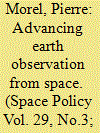

|
|
|
|
|
| Publication |
2013.
|
| Summary/Abstract |
Global Earth observation goes well beyond taking pictures of the Earth from space. Earth observation aims to identify and characterize planetary-scale processes that occur in the Earth interior or the world's oceans, at the Earth's surface or within the global atmosphere, on the basis of weak signals that may be detected in space. This is a truly challenging task that requires the dedicated efforts of professionals and firm public support commitments. The article reveals the scope of global Earth observation, highlights the technical and managerial challenges involved in undertaking it and discusses ways of making it more effective. Competent international cooperation and cost-sharing arrangements are essential for the ultimate success of existing and future activities in this field.
|
|
|
|
|
|
|
|
|
|
|
|
|
|
|
|
| 2 |
ID:
120655


|
|
|
|
|
| Publication |
2013.
|
| Summary/Abstract |
Deliberate and unintentional radio transmissions from Earth propagate into space. These transmissions could be detected by extraterrestrial watchers over interstellar distances. This article analyzes the harm and benefits of deliberate and unintentional transmissions relevant to Earth and humanity. Comparing the magnitude of deliberate radio broadcasts intended for messaging to extraterrestrial intelligence (METI) with the background radio spectrum of Earth, we find that METI attempts to date have much lower detectability than emissions from current radio communication technologies on Earth. METI broadcasts are usually transient and several orders of magnitude less powerful than other terrestrial sources, such as astronomical and military radars, which provide the strongest detectable signals. The benefits of radio communication on Earth most probably outweigh the potential harm of detection by extraterrestrial watchers; however, the uncertainty regarding the outcome of contact with extraterrestrial beings creates difficulty in assessing whether or not to engage in long-term and large-scale METI.
|
|
|
|
|
|
|
|
|
|
|
|
|
|
|
|
| 3 |
ID:
127089
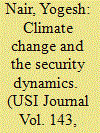

|
|
|
| 4 |
ID:
108826
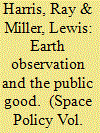

|
|
|
|
|
| Publication |
2011.
|
| Summary/Abstract |
The term 'public good' is often used in satellite Earth observation to indicate that Earth observation data are of value or interest to the public. In fact, the term 'public good' has a more specific meaning, originating in the discipline of Economics, which carries with it a set of assumptions and implications about how markets operate. In this context a public good has two main characteristics: non-rivalry and non-excludability. In their most common digital format, Earth observation data can appear to be both non-rivalrous and non-excludable. However, it is not the digital medium itself which controls the 'publicness' of a good but the conditions of access to that good. This paper explores the meaning of the concept of public goods in an Earth observation context by, first, examining public good theory and related concepts of categories of goods and, second, applying the concepts to nine Earth observation missions, programmes and data.
|
|
|
|
|
|
|
|
|
|
|
|
|
|
|
|
| 5 |
ID:
122526
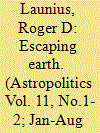

|
|
|
|
|
| Publication |
2013.
|
| Summary/Abstract |
What if we viewed the history of human spaceflight somewhat less through the lens of Cold War politics, which admittedly was central to the race to the Moon, but more as an expression of what might be called a religion of spaceflight? There seems to be a deeply religious quality to advocacy for the investment in and support for human space exploration, lending to the endeavor of a "higher purpose" that helps to explain both the generous nature of the actual investment and the ultimate unwillingness of Americans to eviscerate space budgets despite less than full support for space exploration. This article examines religious conceptions as a means of analyzing what might be termed a "space gospel." I lay out here the proposition that human spaceflight may be viewed as a religion with similar attributes to those present in mainstream religious denominations. This approach to exploring the history of human spaceflight offers a different and useful frame of understanding that broadens basic conceptions about this aspect of the human past.
|
|
|
|
|
|
|
|
|
|
|
|
|
|
|
|
| 6 |
ID:
098854
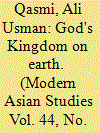

|
|
|
|
|
| Publication |
2010.
|
| Summary/Abstract |
This paper evaluates in detail the policies adopted and the religious ideas held by the power elite of Pakistan during the years from 1947 to 1969. It has been argued that the religious worldview of the power elite was shaped by the discourse of Islamic modernism which allowed envisioning of a state in which (at least theoretically) democracy, rights of minorities, sovereignty of the parliament and flexibility of Islamic laws could be propagated as the guiding principles of the state. Also, by focusing on the life and ideas of Ghulam Ahmad Parvez and by disclosing the details of his close connivance with General Ayyub Khan during the 1960s, the paper will highlight the steps taken to institutionalize Islamic modernism in Pakistan.
|
|
|
|
|
|
|
|
|
|
|
|
|
|
|
|
| 7 |
ID:
091470


|
|
|
|
|
| Publication |
New York, Pocket Books, 2005.
|
| Description |
xxi, 418p.
|
| Standard Number |
9781416500186
|
|
|
|
|
|
|
|
|
|
|
|
Copies: C:1/I:0,R:0,Q:0
Circulation
| Accession# | Call# | Current Location | Status | Policy | Location |
| 054453 | 823.912/BUC 054453 | Main | On Shelf | General | |
|
|
|
|
| 8 |
ID:
042450
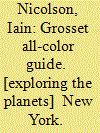

|
|
|
|
|
| Publication |
New York, Grosset & Dunlap, 1971.
|
| Description |
159p.Hbk
|
| Series |
The, Grosset all-color guide series
|
| Standard Number |
0448008688
|
|
|
|
|
|
|
|
|
|
|
|
Copies: C:1/I:0,R:0,Q:0
Circulation
| Accession# | Call# | Current Location | Status | Policy | Location |
| 008763 | 621.38238/NIC 008763 | Main | On Shelf | General | |
|
|
|
|
| 9 |
ID:
122531
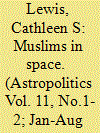

|
|
|
|
|
| Publication |
2013.
|
| Summary/Abstract |
The first men to fly into space precipitated comments about religion and God, but for most of the history of human spaceflight these comments related to Christianity. As International Space Station partners recruit spacefarers from Islamic countries, they face new religious challenges. Islam is distinct from other large monotheistic religions by virtue of the fact that Muslim worship practices require routine attention to Earth geography and astronomy. It is a vantage point that changes in low Earth orbit. Recent Muslim astronauts and cosmonauts have led the way in adapting religious practices to their position above the Earth.
|
|
|
|
|
|
|
|
|
|
|
|
|
|
|
|
| 10 |
ID:
091642
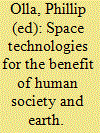

|
|
|
|
|
| Publication |
Livonia, Springer, 2009.
|
| Description |
xxix, 550p.
|
| Standard Number |
9781402095726
|
|
|
|
|
|
|
|
|
|
|
|
Copies: C:1/I:0,R:0,Q:0
Circulation
| Accession# | Call# | Current Location | Status | Policy | Location |
| 054535 | 500.5/OLL 054535 | Main | On Shelf | General | |
|
|
|
|